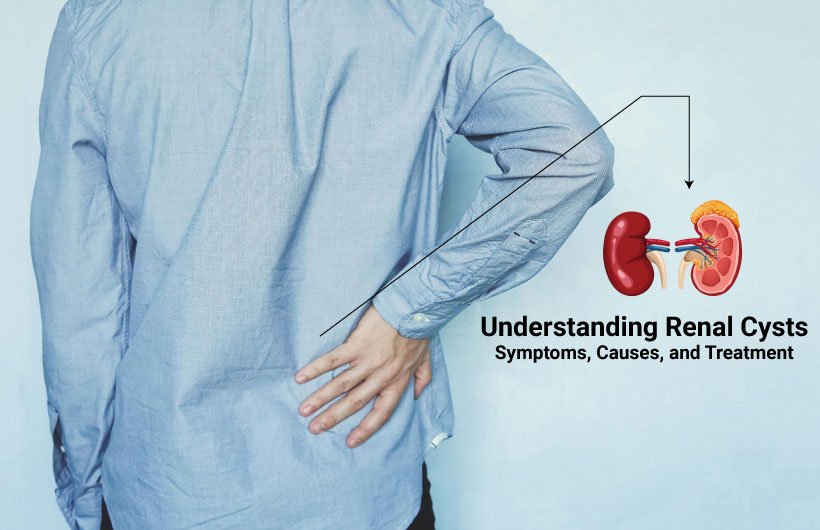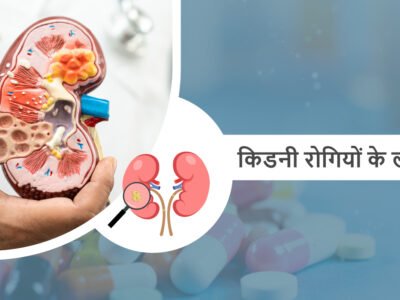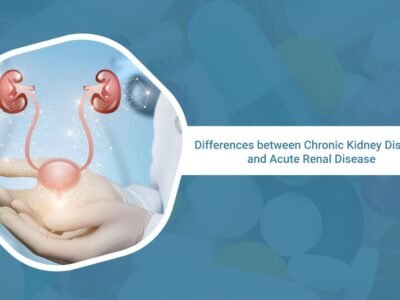Renal cysts are quite common, especially as we age, but they often go unnoticed since they rarely cause symptoms. These fluid-filled sacs can develop in or on the kidneys, and while they’re usually harmless, understanding them can help you maintain good kidney health.
What Exactly is a Renal Cyst?
A renal cyst is a small, fluid-filled sac that forms on or within your kidney. These cysts can vary in size—from tiny spots to larger growths. Most of the time, they’re discovered by accident during imaging tests for unrelated issues. There’s usually no cause for concern, but in some cases, these cysts might hint at something more serious, like cystic kidney disease.
Simple vs. Complex Renal Cysts: What’s the Difference?
- Simple Renal Cysts: These are the most common type and usually don’t cause any trouble. They have smooth, thin walls and are filled with clear fluid. Since they’re typically benign, they often don’t require any treatment.
- Complex Renal Cysts: These are a bit more complicated. They might have irregularities like thicker walls, calcifications, or solid components. Because of these features, they might need closer examination to ensure they aren’t something more serious, like kidney cancer.
Spotting the Signs: Renal Cyst Symptoms
Most renal cysts are silent, causing no noticeable symptoms. But if they do cause issues, here’s what you might experience:
- Flank Pain: One of the more common renal cyst symptoms is a dull ache or sharp pain in your back or side, usually on the side where the cyst is located.
- Abdominal Discomfort: Sometimes, you might feel a sense of fullness or discomfort in your abdomen.
- Blood in Urine (Hematuria): If a cyst ruptures or irritates the kidney, it could lead to blood in your urine, which can be alarming.
- Frequent Urination or Urgency: A larger cyst might press on your bladder, making you feel like you need to go more often or urgently.
- High Blood Pressure: In some cases, renal cysts can interfere with kidney function, leading to elevated blood pressure.
What Causes a Cyst on the Kidney?
The exact reason why a renal cyst forms isn’t fully understood. However, they seem to develop from small pockets of fluid in the kidney tissue that slowly expand over time. They become more common as we age, particularly after the age of 50. Recognizing the cyst on kidney causes helps in understanding who might be at risk and what to watch out for.
Cystic Kidney Disease: A Closer Look
While simple renal cysts are usually no big deal, cystic kidney disease is a different story. The most well-known type is polycystic kidney disease (PKD), a genetic disorder that causes numerous cysts to develop in the kidneys. These cysts can lead to larger kidneys and impaired kidney function over time. PKD is hereditary, meaning it can run in families, and it’s categorised into two types: autosomal dominant and autosomal recessive, depending on the specific genetic mutation.
How Are Renal Cysts Diagnosed?
Most renal cysts are discovered incidentally during imaging tests done for other reasons. The main tools for diagnosing renal cysts include:
- Ultrasound: This is often the first test used. It’s non-invasive and can easily detect renal cysts, distinguishing between simple and complex types.
- CT Scan: If more detail is needed, a CT scan can provide clearer images of the cyst, helping to assess its size, shape, and any irregularities.
- MRI: For complex cases, an MRI might be recommended to get an even more detailed look.
Treatment Options for Renal Cysts
Treatment for renal cysts largely depends on the type, size, and whether the cyst is causing any symptoms or complications. Here are some of the key renal cyst treatment options:
- Watchful Waiting: If your cyst is simple and not causing any issues, your doctor might recommend just keeping an eye on it with regular imaging tests to ensure it doesn’t grow or develop concerning features.
- Cyst Aspiration and Sclerotherapy: If your cyst is causing discomfort, a procedure known as aspiration might be performed. Here, a needle is used to drain the fluid from the cyst, and sometimes a special solution is injected afterwards to prevent the cyst from filling up again.
- Laparoscopic Surgery: For larger or more complex cysts, surgery might be necessary. Laparoscopic surgery involves making small incisions in the abdomen to either remove the cyst or drain its contents. This procedure is minimally invasive, meaning you’ll recover faster than with traditional surgery.
- Cyst Removal: In some situations, especially if there’s a concern about cancer or the cyst is causing significant problems, the entire cyst might need to be removed surgically.
Keeping Your Kidneys Healthy: Lifestyle Tips
Even though you can’t always prevent renal cysts, there are things you can do to maintain overall kidney health:
- Stay Hydrated: Drinking plenty of water helps keep your kidneys functioning properly and can prevent urinary tract infections, which might aggravate symptoms.
- Control Blood Pressure: Keeping your blood pressure in check through diet, exercise, and medication (if necessary) is vital for kidney health.
- Regular Check-Ups: If you’ve been diagnosed with a renal cyst or cystic kidney disease, make sure to keep up with regular doctor visits and imaging tests to monitor your condition.
Potential Complications to Be Aware Of
While most renal cysts are harmless, there are some complications to watch out for, particularly with complex cysts or if you have cystic kidney disease:
- Infection: If a cyst becomes infected, you might experience fever, pain, and tenderness in the area of the kidney.
- Rupture: Sometimes, a cyst can burst, causing sudden, sharp pain in your side or back.
- Kidney Function Issues: Large or multiple cysts, especially those associated with cystic kidney disease, can impair kidney function, possibly leading to chronic kidney disease or even kidney failure.
- Hypertension: As mentioned, renal cysts can contribute to high blood pressure, which may need to be managed with medication.
When to Consult a Doctor
If you notice any renal cyst symptoms—like persistent pain in your side or back, blood in your urine, or unexplained high blood pressure—it’s important to see a kidney specialist. Early diagnosis and proper management can help you avoid complications and keep your kidneys healthy.
Conclusion
Renal cysts are usually nothing to worry about, but it’s always good to be informed. Understanding the potential cyst on kidney causes, being aware of renal cyst symptoms, and knowing your renal cyst treatment options can empower you to take charge of your kidney health. If you suspect you have a renal cyst or are experiencing symptoms, don’t hesitate to consult a healthcare provider.
For expert advice and treatment, consider reaching out to a kidney specialist in Ahmedabad Dr. Ravi Bhadania, a highly respected specialist in renal health. Dr Bhadania’s extensive experience and compassionate approach ensure that you receive the best possible care tailored to your needs. Taking a proactive approach to your health is key—by staying informed and maintaining regular check-ups, you can ensure that any renal cysts are monitored and managed effectively.


